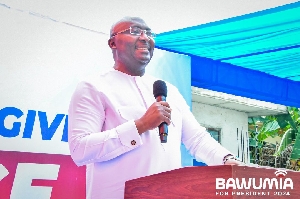Opinions of Sunday, 12 September 2004
Columnist: Adomako, Appiah Kusi
Funding Of Political Parties: The Case Against
INTRODUCTION W ith the coming into force of the 1992 Constitution, a number of political parties have sprung up. There are those that date their roots far back before independence and those that are new in the political front.
Democratic governance has caused the budget of the government of many countries to increase exponentially.
In Ghana, huge sums of money in the form of salaries and allowances given to the 200 parliamentarians, Council of State members and other government institutions established with coming into effect of the 1992 constitution continues to burden government budget. Why do we have to fund agencies like the National Commission for Civic Education, Commission For Human Rights and Administrative Justice and others like even the Electoral Commission? Why should the government give 100 billion cedis to the electoral commission to prepare new voters register? The only answer I will give is that: ?If You Think Democracy Is Expensive Try Autocracy.?
The issue of funding of political parties in Ghana is not new. This issue was raised during the reign of the National Democratic Congress. The government of the day rejected this concept as a heresy and the debate seemed to have died a natural death. Ironically less than four years after the idea was rejected, the debate of funding political parties in Ghana has arisen. Do we consider funding political parties a luxury to our democracy and conclude that such luxuries are not an imminent need to the establishment and progress of our democracy? Issues like these need dispassionate debate. What is needed is a critical and objective analysis of issue to see if the merits outweigh the demerits and if it will ultimately reflect in the development of our democracy. A critical and objective analysis on the matter would create for us a sound bed on which our democracy can be buttressed. Failure to accurately formulate a sound policy will serve as a thorn in our nations ribs. What we need now is not empty illusions in philosophical debates, but a careful analysis of the situation to help us formulate a pragmatic and workable policy and code for funding our political parties. Essentially, what we need is to make our political parties functional enough to contest on a level playing field against each other. In this document, we will first look at the case against funding political parties and some of the common arguments that have been raised and then we will look at the case for funding of political parties and then we end by drawing conclusions and giving recommendations.
But before that, let us take a quick glance at the challenges that parties face in funding their activities and the repercussions.
FINANCIAL CHALLENGES OF RUNNING A POLITICAL PARTY
Running a political party is not an easy enterprise. A party that needs to be registered by the Electoral Commission needs to satisfy conditions like having offices in constituency of the country. Each office needs to be manned by secretaries and accountants and the like. The services of these workers need to be paid for. Renting offices for constituencies and regional offices, furnishing the offices, paying utility bills all consume huge sums of funds.Political parties need to fund their electioneering campaign ? media advert, organizing and hosting rallies, paying for the services of polling agents, etc. Parties need to employ the services of qualified professionals to work with them at various levels. However due to lack of funds to pay for the services of these professionals, political parties in Ghana have tended to engage the services of faithful party volunteers.
Mr. Dan Lartey of the Great Consolidated Peoples Party was quoted to have said that the inability of his party to have polling agents at all the polling stations caused him dearly.
The 1992 Constitution postulates a level playing field for all the parties but when it talks directly about funding of political parties, the Constitution spells it clearly that only citizens of Ghana may make financial contribution to a political party registered in the country.-(Article 55 section 16). Though for obviously good intents, this has tightened the noose on the funds that parties can raise.
The loud silence of the constitution concerning how political parties should be funded has made parties find their own ways and means of funding their activities. We know through experience that parties in the country get their income from their faithful ones. Most of these people are contractors who tend to donate monies to the parties they belong to with the view that their companies will get contracts should the party come to power. Ruling parties also give contracts to its political favorites with kickbacks being ducted at source and to be paid to the party accounts. This decrease in budget for the contractor will obviously spell shoddy work. This has led to the shoddy works we have been seeing in our country. Its time we put a hold on this vicious cycle of corruption.
THE CASE AGAINST STATE FUNDING:
The issue of state funding of political parties is not only a political matter. It is also a civil society matter.One argument against this system of funding of political parties is that if parties can rely on state funding, they will renege on their attempt to bond with civil society. In that case, the whole democratization exercise is often defeated. This statement simply put means that such state funded parties will be divorced from civil society and the electorate.
There is the notion also that the parties will be less interested in representing and fulfilling the needs of the citizenry and there will be a reduced passion for the opposition parties to actively be involved in the democratic process.
Another anti-funding notion is that this will decrease the internal democratic processes in the parties. When the parties have sufficient funds from the state coffers, they would rather buy services they need for the survival and smooth operations of the party other than seek the services from their own members, which hitherto would have increased a sense of belongingness towards the party and what it stands for.
Another reason for the anti-funding campaigners is that what the Norwegian CMI calls ?party-entrepreneurs? will spring up from all places, and then the whole democratization process becomes an open market for all sorts of ?party entrepreneurs? to join the ?business?.
A last reason we would talk about is the argument that since not all parties in the early stages of a democratic state have survived, funding all parties in the early democratization process will be invariably increasing the unneeded lifespan of parties that have no business in the democracy and that are of no significant meaning to the electorate. In short, the life of all the zombie parties will be prolonged at a cost to everyone and at a profit to none.
The above arguments, have all led many democratic policymakers and observers to conclude that state-funding is not just unproductive, but counterproductive and unbeneficial to the democratic process.
The arguments by the pro-movement for state funding that it curbs corruption doesn?t hold water. If political parties are still going to be free to raise private funds, then there still will be party contributors who will still demand for contracts whether or not there was state funding available. They gave. They must recoup their ?investment? either way. The other argument that political parties are an integral part of the democracy so they should be funded also falls short.
1) The Media, NGO?s, civil society and even businesses and corporations are also parts of the democratic process. Should they all be state-funded?
2) Also members of the Judiciary, the Executive and the Legislature are all employees of the state. Workers at political party offices and their field officers are not state employees, so why should the state pay their salaries?
3) Also, if we fund parties, what happens to independent candidates? Are they not part of the process? If they are also funded, then it really becomes a whole market as was first stated.
Lastly, if it is to offer a level playing field against the incumbency, then we are preconcluding that the incumbency should have access to the state apparatus and resources to campaign. This is simply not tackling the root problem of exploitation by incumbency. Lets bear in mind that no matter how much funds the state gives to political parties, if the incumbent is allowed to be corrupt, they will embezzle more just to have a financial edge over the competition.
Finally let us consider this!
Consider this!
If you make your way through the interior parts of the deprived regions in Ghana. Educational facilities there is nothing to write home about. Some pupils are attending classes under a trees and dilapidated structures. One headteacher teaches four classes. From primary one to J.S.S 3 the school can painfully boast of about three teachers. Residential facilities at the universities can only house less than 40 percent of students. And of qualified students, the universities can only admit less than 50 percent. I can go on and on. Can?t we state use these funds to improve on educational and health facilities? Can our HIPIC economy afford such a luxury? For now let us set our national priorities right and do the right thing at the right time.
Leaders of Tomorrow Foundation,
P.O. BOX. KS 13640.
Kumasi-Ghana, West Africa.
www.interconection.org/lotfound

Views expressed by the author(s) do not necessarily reflect those of GhanaHomePage.












